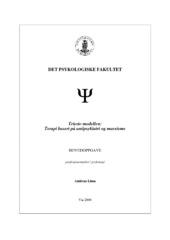| dc.contributor.author | Lima, Andreas | |
| dc.date.accessioned | 2008-11-10T11:56:16Z | |
| dc.date.available | 2008-11-10T11:56:16Z | |
| dc.date.issued | 2008-04-14 | eng |
| dc.date.submitted | 2008-04-14 | eng |
| dc.identifier.uri | https://hdl.handle.net/1956/2886 | |
| dc.description.abstract | The psychiatric health service in Trieste is built on Franco Basaglia’s theories which have roots in antipsychaitry and neomarxism. He is a critic of running psychiatric institutions based solely on scientific understanding of psychic suffering. Basaglia’s understanding of psychic suffering is that it is the current power structures in the community which make psychic suffering problematic. Treatment will thereby focus on changing these structures. To make this possible, one must involve the whole community. The treatment goal is not to ease the symptoms, but to bring the people with psychic suffering to function in the community, and to be accepted by the community for being the persons they are. Research seems to point out that this treatment model is at least as good as regular psychotherapy forms, such as psycho-dynamic or cognitive therapies. In this paper I have studied the theoretical foundation for this treatment, and have discussed this in light of newer research and theories. Although some of the theoretical prerequisites are doubtful, the Norwegian health service may still learn something by the Trieste-model when it comes to attitudes toward people with psychic suffering and attitudes toward one’s own profession as a science. We may also learn to involve people around the patients in the treatment, and to value taking into consideration how the community’s values affect psychic suffering. | en_US |
| dc.description.abstract | Den psykiatriske helsetenesta i Trieste er bygd på Franco Basaglia sine teoriar som har røter i antipsykiatri og neomarxisme. Han er kritisk til å driva med psykiatriske institusjonar berre etter ei vitskapeleg forståing av psykisk liding. Basaglia si forståing av psykisk liding er at det er dei gjeldande maktstrukturar i samfunnet som gjer psykiske lidingar problematiske. Behandlinga vil dermed gå ut på å forandre desse strukturane. For å klare dette må ein involvera heile samfunnet. Målet for behandlinga er ikkje symptomlette, men at den psykisk lidande skal kunne fungere i samfunnet, og verta godteken av samfunnet for den ein er. Undersøkingar tyder på at denne behandlingsforma er minst like god som vanlege psykoterapiformer, som psykodynamiske og kognitive terapiar. I denne oppgåva har eg sett på det teoretiske grunnlaget for denne behandlinga, og diskutert dette i lys av nyare forsking og teoriar. Sjølv om noko av dei teoretiske føresetnadane er tvilsame, kan norsk helsevesen lære noko av Trieste-modellen når det gjeld holdningar til psykisk lidande og holdningar til eige fag som vitskap. Me kan og læra å involvera menneska rundt pasienten i behandlinga, og viktigheita med å ta omsyn til korleis samfunnets verdiar påverkar psykisk liding. | no_NO |
| dc.format.extent | 304180 bytes | eng |
| dc.format.mimetype | application/pdf | eng |
| dc.language.iso | nno | eng |
| dc.publisher | The University of Bergen | eng |
| dc.subject | Terapi | nob |
| dc.subject | Antipsykiatri | nob |
| dc.subject | Galskap | nob |
| dc.subject | Holdninger | nob |
| dc.title | Trieste-modellen: Terapi basert på antipsykiatri og marxisme | nob |
| dc.type | Master thesis | |
| dc.rights.holder | Copyright the author. All rights reserved | |
| dc.rights.holder | The author | eng |
| dc.description.localcode | PSYK300 | |
| dc.description.localcode | PRPSYK | |
| dc.subject.nus | 736102 | eng |
| dc.subject.nsi | VDP::Samfunnsvitenskap: 200::Psykologi: 260::Klinisk psykologi: 262 | nob |
| fs.subjectcode | PSYK300 | |
